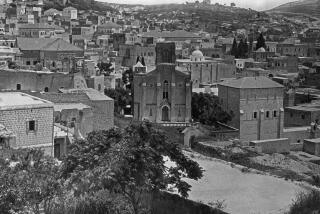Gypsy Bride, 15, Has Wedding Bell Blues
VOLUNTARI, Romania — Engines grumbling in the Balkan twilight, giant semis roll past the truck stop and its overflow of wedding guests.
Gears grind as the trucks leave the highway ramp and head northeast toward Bucharest, laden with goods for the capital’s growing middle class -- Japanese electronics, German roadsters, French cosmetics.
Oblivious to this parade of a changing Romania, partygoers at the roadside restaurant are celebrating a remnant of the old Romania.
It’s a Gypsy wedding, and the 15-year-old bride is mourning shattered dreams of studying medicine as she steels herself for a life more Middle Ages than Modern Times. A schoolgirl just weeks ago, she soon will be little more than her husband’s chattel.
After years of backwardness, most of Romania appears to be on the mend. Roads long the bane of the Balkans are fixed, rest-stop toilets are generally clean, and membership in the European Union is set for 2007.
Bucharest was the darkest capital of the Soviet bloc. Now, neon crawls and pulsates in a city of light, whose vibrant pulse can be measured by the daytime din of construction and traffic.
At the Corina truck stop, where diesel fumes mingle with the smell of barbecue, the colorfully clad wedding guests also seem a part of the new Romania -- on the surface.
Black Mercedes limousines are parked outside, and heavy gold chains glitter on necks and wrists. Roused by frenetic clarinet licks, the dancing crowd pumps hands into the air and sways to the sounds of Gypsy folk -- an eclectic mix of Romanian pop and traditional Gypsy music.
“Long live my husband. I’ve got the perfect wife,” the sweaty singer wails, alternating between the roles of newlyweds extolling their partner’s virtues.
Broad grins split the faces of the parents of the bride, and no wonder -- poised and pretty, she’s a dream in white satin, huge gold earrings and faux pearls piled high in her hair.
But Narcisa Tranca’s smile is forced and her mind seems far away as she obliges requests for a dance. Her wedding is a rite of passage into a role she dreads -- cleaning, cooking, working in the fields and having babies. Her husband will decide on everything.
“I’d like two girls and two boys,” says the groom, Marin Rupita, 18. Asked if his wife agrees, he grins. “I don’t know. I haven’t asked her yet,” he says.
School? “Not once she’s at my house,” says Marin, who hasn’t seen a classroom from the inside since fourth grade. “She’ll be busy with housework like the other women in the family!”
Just weeks ago, Narcisa was in school in her town outside Bucharest, an A-student with dreams of studying medicine. She pleaded with her parents to let her continue her education.
No, they said. That is not the Gypsy way.
“I wanted to be a pediatrician,” she says, resignation tugging at the corners of her mouth. “I told them again and again, but my parents just wouldn’t listen.”
Her father, Marcel Tranca, says that had he not agreed to the marriage, the alternative would have been worse: Narcisa’s abduction by potential suitors who didn’t want to wait for negotiation.
Now the best she can hope for is that her parents will manage to persuade their new son-in-law to live in the Bucharest area, rather than in his home village about 200 miles away, so she can go back to school. Negotiations with the clan are under way.
Although the minimum age for marrying in Romania with a parent’s consent is 16, some Gypsy brides are as young as 12. Narcisa’s wedding won’t be legal in the eyes of the state, but even under communism the government has never interfered with Gypsy marriage customs.
Though she could have completed eighth grade before her wedding, Narcisa left school several weeks early. Hours before the start of the wedding feast, her classmates -- non-Gypsies -- came to her house to bid tearful goodbyes.
“It would have been useless to continue,” she says. “As of tomorrow, I’ll just be stooped over a pot or a broom all day anyway.”
Narcisa’s world is as old as the 14th century, when the ancestors of what now are an estimated 8 million European Gypsies started arriving from India.
Discrimination and clannishness created a gap that persists to this day. Millions of Gypsies scattered across Europe, particularly in the former communist states, are overwhelmingly disadvantaged in education, job opportunities and status.
Governments in the east are pushing to do away with that divide, partially in recognition that it threatens their chances of meeting the standards of equal rights for joining the rich club of the European Union.
In a TV spot paid for by the European Union, an old Gypsy takes his accordion, transforms it into a school bag and gives it to his grandson. The ad fades out with this message: “Roma children want to go to school.”
Roma, “the People” in their language, is what Gypsies prefer to be called.
With the blessing of both households, a cousin brought Marin to meet Narcisa seven months ago. Until the wedding party, the two saw each other briefly just four times.
Her parents reached a deal with Marin’s family, a clan of prosperous horse traders: $2,000 for Narcisa.
While many Gypsies fight pressures to conform to more modern ways, others are slowly opening to changes.
Asked whether it is time to put priority on education for young Gypsies, one of Narcisa’s uncles quickly says, “We have to.”
“School takes a long time,” Marin Mihailache adds. “But we’re [barely] at the survival level.”
Associated Press reporter Alexandru Alexe in Bucharest contributed to this story.
More to Read
Sign up for Essential California
The most important California stories and recommendations in your inbox every morning.
You may occasionally receive promotional content from the Los Angeles Times.










